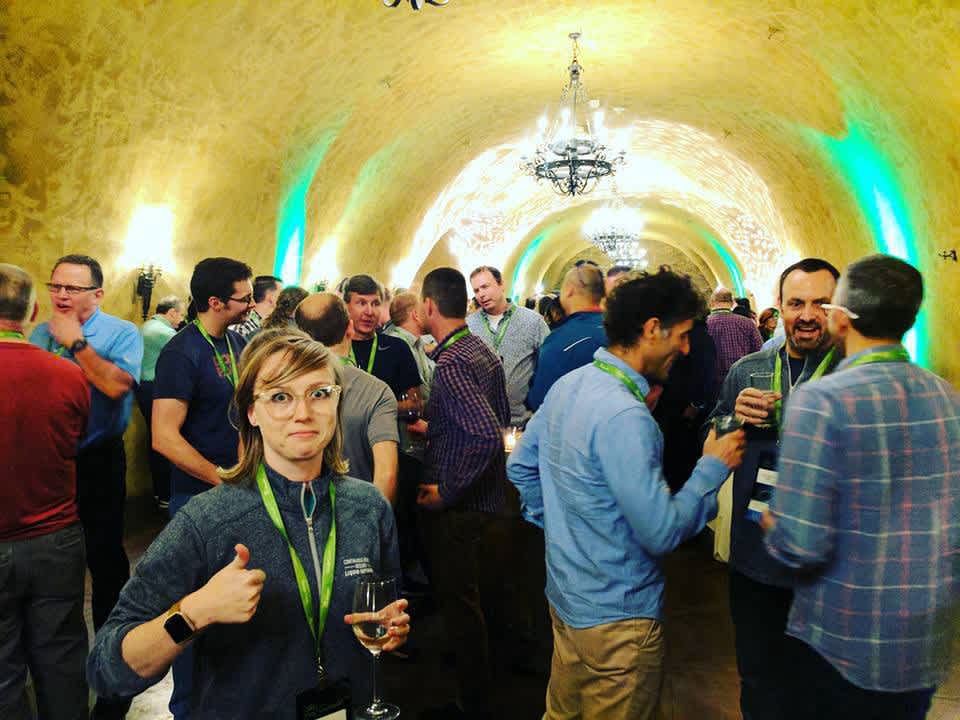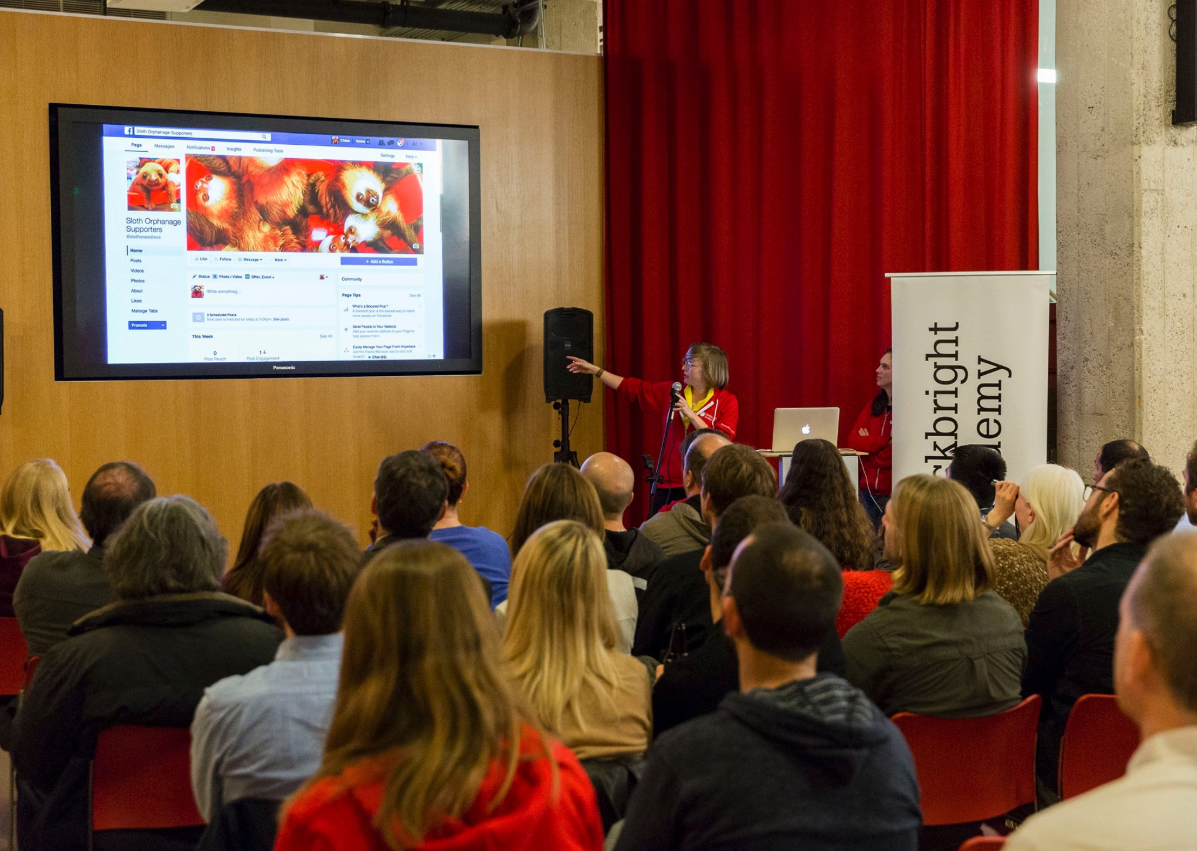Life at Sentry: Meet Chloe Condon, Developer Evangelist(a)
Life at Sentry: Meet Chloe Condon, Developer Evangelist(a)In our appropriately named Life at Sentry series, we talk to Sentry employees about what life is like at Sentry (and how they ended up here). In this edition, we're chatting with Chloe Condon, Developer Evangelist(a) at Sentry, about stumbling into tech, imposter syndrome, and not getting cast as Carrie in "Carrie: The Musical." Take a look at our available jobs if you're interested in joining us.
Tell me about your path to Sentry.
I grew up in the theatre: my mother was a costume designer and my dad is a director/playwright, so I grew up going to performing arts camp and performing arts high school, and moved to SF for the first time to get my theatre degree. When I graduated from SF State, I had to get a day job to support my theatre career, so I kind of stumbled into tech first as a salesperson at Yelp, and then ended up working at a bunch of other startups doing pretty much everything except engineering. At the time, I didn't know what engineers did, I just thought they were dudes in Patagonia jackets who rolled in at 11.
While I was working as an executive assistant, I accompanied my boss to a talk at Google about getting K-12 girls interested in programming. I was really fascinated by all the work these people were doing to give young girls role models, or at the very least, a visualization of a female engineer. It really resonated because when I was young, I was really good at computers but my parents were artists, so no one could tell me how they worked. I imagined an "engineer" to be a dude in a lab coat physically putting a computer together with a hammer. After I saw that talk, I told my boyfriend that it would have been really cool to have all these resources as a kid but that my ship had sailed, and he said, "You know you can still learn, right?" So I started teaching myself through online code school platforms, and eventually quit my job after I applied (and was accepted) to Hackbright (an all-female software engineering bootcamp in SF).
Hackbright was by no means a walk in the park (I dealt with a lot of imposter syndrome), but I had a career "lightbulb moment" happen during Hackbright's demo night (where everyone in our Hackbright cohort presented their final projects). Everyone was so scared to do public speaking and they were all looking at me like I was crazy because I was so pumped and said, "This is the EASY part! Making the apps was hard but talking about it is easy!" And for me, that was the moment I realized that I come to this industry with very specific expertise. I may lack some STEM fundamentals that other women had, but I know how to talk to (and in front of) people. So when it came time to search for jobs, I realized I was able to sell myself really well in developer evangelism/developer relations roles because I had over twenty years of public speaking and writing experience. I ended up getting my first evangelist job at a small startup in Mountain View.
A little bit after that, a former Sentry employee, who had also attended Hackbright, reached out over email and said, "We have women-sized shirts" (I had written an article that went viral about what it's like to be a woman at a tech conference, and mentioned that none of the booths had shirts that fit women), so I ended up getting coffee with her and another Sentry employee, getting a t-shirt, and the rest is history.
What It's Like to Be a Woman at a Tech Conference
What is your team working on?
Marketing's role is to educate people who don't know about Sentry, or error reporting in general, on how they can a) do error reporting and b) do it well. My job revolves around creating content to educate people on that, as well as on our open source work and why open source matters, to us, to companies, and to the software world. I also help with community building - the monthly Sentry Scouts Meetup is my baby. We use the meet-ups as a fun, informal way to build awareness that we support so many tech communities, whether open source, DevOps, security, UX, etc. We're all about community building, brand awareness, and highlighting awesome people in this community. We also do it all with a sense of humor, which makes excited about working on this team and actually was part of the reason I joined (I remember first visiting the website and seeing "Your shit's broken, let us help you fix it" somewhere on a page).
I feel like we really empathize with developers, and we know what they like and need, so anytime any of us on the marketing team create any sort of content or event, our goal is to have a developer walk away from it going, That was really fun and cool, and recommend it to someone else.
🏕 Pumped for next week's @SentryScouts UX meet-up! If you find yourself in SF next Wednesday, please come join the fun! 🐻: https://t.co/C8R24u3t52CC 🎥: @DeadSuperHero @TheKaterTot @ryansgoldman @bradlygreen @wiredferret @beccaroro @LeahYuk @andytuba @brianglucas pic.twitter.com/Hy5T9ZGdc3— Chloe Condon 🎀 (@ChloeCondon) March 14, 2018
As far as what the marketing team is working on, the possibilities are endless. I love that my manager doesn't blink an eye when I say, "I'm going to expense all this Star Wars stuff…and this squirrel puppet…." We're in this really unique time where we're developing our brand, and it's so different from the typical startup; people have started associating us with all the fun, silly (but informative) content.
What's important about the problem Sentry is solving?
We are in somewhat of a new space. Up until this point, people have had their own personal ways of getting alerted about, and dealing with, errors. David [Sentry founder/CEO] created this for himself as personal project because that kind of tooling just wasn't there. Right now, there's a lack of knowledge and material out there on how to deal with errors, so people are either not using anything at all, or using a tool but not fully understanding how to get the most out of it or what the best practices are. Sometimes I'll talk to companies and they say, "We just set alerts every time we run into something," but then I ask, "Well, how do you know what to set alerts for if it hasn't happened yet?" and they're like, "Oh, we just have a fire drill every time it happens," and I'm like, "Don't do that!!!" So what's most exciting for me is educating people and making their lives easier.
I have never been in a situation here where someone has shut down my idea, or thought it was too big/too small. Everybody is really open with their opinions and really values other opinions.
I also like that our tool is a product that supports almost every technology and language, and works really well with other tools, so in my talks I usually say something like, here are all the tools you can use to answer this question or solve this problem. Typically in evangelism, companies talk about why you should use their product over all other ones, and for us, it's super inclusive, probably as a function of us being in open source, and part of that is us building a product that really brings it all together in one place.
Finally, I love that Sentry is open source, and a lot of people have touched our product. When I go to talks or conferences and tell people I work at Sentry, it's cool to frequently hear, "I've used that! I love it!"
Describe Sentry in three words.
Empathetic: I've never been in a situation here where someone has shut down my idea, or thought it was too big/too small. Everybody is really open with their opinions and really values other's opinions. I see it in the way we all interact with each other, I see it in the way we make decisions about who to hire. Empathy is super important here.
Fun: Several of my days have included dressing up people in squirrel costume and reenacting Star Wars fights, so the nature my role is very fun, but the fact is Sentry's brand is fun in itself. I also have a lot of fun with all my coworkers; I genuinely enjoy coming into work and working with everyone here. It's a really unique culture, and is so different from what I've experienced anywhere else.
Diverse: I've actually had candidates ask me, "Wow, do any men work here?" which is crazy for this industry. We've got diversity in gender, years of experience, ethnicity, etc., but we've also got such great diversity in backgrounds (our manager Ryan worked for Pitchfork, Richard made a film, I was an actress) - having diverse backgrounds is so important for being able to build for all our users and make this company successful, Sentry understands and values that.
If you look around, we have a very diverse team with no template for what a typical Sentry employee looks like. We really value individuality and quirkiness here, and that is so important for a culture of inclusion.
What makes you say Sentry understands and values diversity?
I just remember just how self-aware Sentry was about inclusivity in the interview process. They apologized for needing to make a couple last minute changes, and I later found out the change was to make sure I was interviewed by a woman. I was floored at the effort and thoughtfulness.
Also, the fact that we have hired so many bootcamp grads is amazing. It takes a certain type of company and attitude to take on investing and training junior engineers. I also think we're good at hiring people from diverse backgrounds and non-traditional paths, and really understanding how those backgrounds are valuable to our roles here. Our content is unlike any other content out there, and that's because we have people from diverse industries- a musical theater actress and film maker- working on it. If you look around, it's a very diverse team with no template for what a typical Sentry employee looks like. We really value individuality and quirkiness here, and that's so important for a culture of inclusion.
What kind of cultures and/or environments cultivate inclusion?
It's really important for companies to foster a culture of cross-team communication and events. When there are spaces and opportunities for pockets of diversity to interact with certain teams that are traditionally non-diverse, that open communication between departments leads to empathetic environments. Sentry is really good at the open communication in that they hold open office hours across all departments, and use email and All Hands to recognize/celebrate small and big wins for everyone, not just people who gravitate toward the spotlight more. We also had someone come in to talk about allyship, and it was super cool to see people having a small group discussion afterward, wherein a male coworker was like, "Wait, this happens?" and wanted to hear other people's experiences. These kinds of talks and honest conversations raise awareness and educate people.
[My imposter syndrome] went on even through my graduation, where I got chosen to speak at the ceremony, and on the car ride there my boyfriend said, “Well, I guess they are not kicking you out…” and I said, dead serious, “There is still an hour.
You mentioned imposter syndrome earlier. Can you talk more about that?
While I was in Hackbright, I felt like a huge imposter. Everyone else came from math, science, or business backgrounds, and here I was, this quirky actress with bows in my hair and sparkle glasses, so I felt so out of place - like I didn't belong, that I was going to get kicked out - and more importantly, I felt like other people saw right through me. This went on even through my graduation, where I got chosen to speak at the ceremony, and on the car ride there my boyfriend said, "Well, I guess they're not kicking you out…" and I said, dead serious, "There's still an hour." I experienced very intense imposter syndrome throughout the whole thing, and even up until now, I feel imposter syndrome almost everyday. That said, I'm always surprised by the number of people I talk to, who I really admire and who are much more senior than me, that experience imposter syndrome, so I think the first step to dealing with your own imposter syndrome is to know that almost every one feels it.
Chloe at her Hackbright graduation, looking VERY unimposter-like 💪
The best thing you can do is talk to other people about it. When I was interviewing for my first role, I vented and talked with the other women in my Hackbright cohort, and it was so reassuring to hear that I wasn't feeling and experiencing anything isolated. We all kind of felt like that meme of that dog drinking coffee and saying, "This is fine," while the place burns down around it. If you ever get into the situation where things do actually feel out of your control, reach out to your mentor or manager because they are such a self-inflicted and self-inflicting feelings. No one is out there saying you can't do this (aside from baseless trolls). Even your own brain can be really mean sometimes, so self-awareness- challenging those untrue, mean thoughts- is key. Mindfulness helps with that, so find practices like yoga, going to a sauna, or even just writing one nice thing about yourself everyday.
You talk a lot about being a woman in tech in your writing and podcasts. What's on your mind these days?
The article I've written that's received most traction was "What It's Like To Be A Woman At a Tech Conference," and I've actually been brewing up a follow-up article on approachable feminism because the number one response I get to that article is from men who've never read about something like this from an approachable/non-aggressive perspective, and who appreciate reading something about diversity that is more matter-of-fact and humorous. So lately I've been thinking about how to make feminism approachable for everyone. I have discovered that many women don't really know what "feminism" means. A lot of people associate feminists with a bra-burning angry mob, when in reality feminism merely means equal rights for women. Don't get me wrong, there is a time and a place to get angry, and I've done definitely called people out, but if we want to have a serious discussion about this and want people to join our case, we need to be able to call them out without scaring them away.
When I'm at talks or conferences, even when I'm hanging out at Sentry's booth, people often assume I'm tagging along as a non-engineer/wife/daughter/etc. There's a really big difference between someone coming up to our booth and asking me if they could speak with an engineer and me angrily going, "HOW DARE YOU?!", and me educating them by saying, "Is it the lipstick? The sparkly glasses? This dress with dogs printed all over it? I actually am an engineer, how can I help you?" Often that leaves a positive impression on them, even if they are really embarrassed, and they don't ever make that mistake again. I'm really thinking about making this whole idea of equality and representation of women in tech less of an angry cause, and more of a positive cause for good.
What advice would you give to your younger self?
Well, my first instinct and honest answer is, "Don't get a degree in theater. Use all your college tuition to buy yourself a house in SF, teach yourself to code online, and then resell your house."
Okay, okay, I'd probably say, "It's going to be okay. Even though you didn't get cast as Carrie in 'Carrie: The Musical' [I was HEARTBROKEN], it's not the end of your career. You're going to be fine. But yeah, learn how to code."
This could be us but you learned how to code (Chloe in a theatrical production of "Xanadu")
Looking for an inclusive, supportive workplace? Look no further — we’re hiring! Check out sentry.io/careers.






